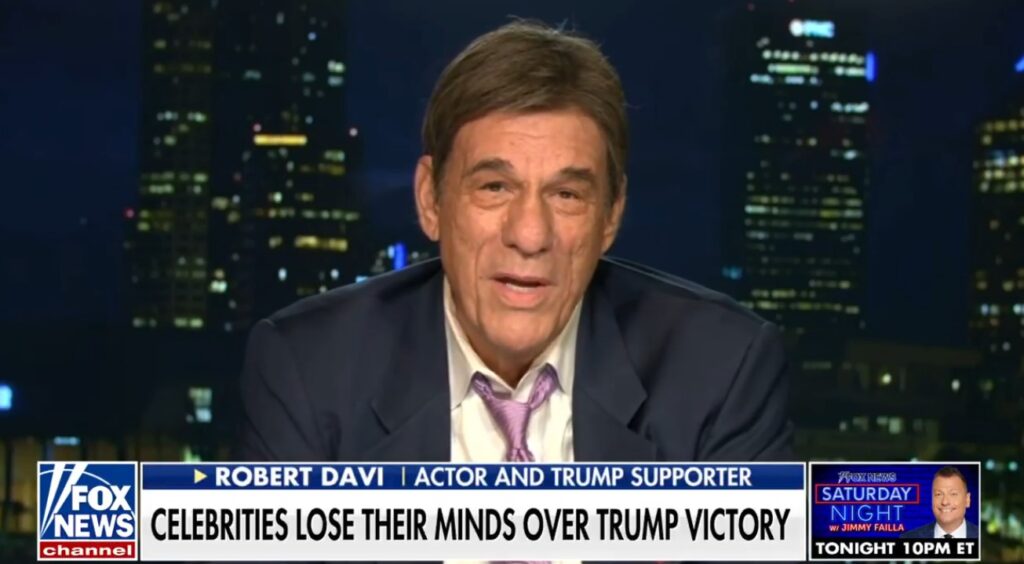Celebrity Reactions to Trump Victory and Davi’s appearance at Mara Lago
In the interview between Brian Kilmeade and Robert Davi, the actor and singer shared his thoughts on the 2020 presidential election, offering a perspective on the political landscape that combines personal experience, Hollywood insights, and his admiration for former President Donald Trump. Davi, who is best known for his roles in films such as The Goonies and Die Hard, provides a candid, at times provocative, take on the intersection of celebrity, politics, and American identity. The interview touches on a variety of topics, but the main theme revolves around Davi’s views on the 2020 election and his disillusionment with certain elements of Hollywood and the mainstream political establishment.
One of the most striking elements of Davi’s interview is his comparison of the 2020 presidential race to a “Rocky” film. Davi, who has a deep affection for the underdog story, sees Trump’s victory in 2016 as a similar kind of triumph against overwhelming odds—something that resonated with a large swath of the American public. His comparison to Rocky is more than just a cinematic reference; it captures the drama of a political outsider who defied the expectations of the elite. Trump, much like Rocky Balboa, was an underdog who overcame significant obstacles, including a media establishment that was overwhelmingly hostile and an entrenched political class that underestimated his appeal.
Davi’s commentary on the 2020 election highlights what he perceives as the media’s role in elevating Joe Biden’s candidacy, alongside his criticism of the overwhelming support that celebrities and the entertainment industry gave to the Biden-Harris campaign. He draws attention to what he sees as the absurdity of Hollywood’s enthusiasm for Biden, claiming that it seemed disconnected from reality and out of touch with the concerns of everyday Americans. He points to celebrities who used their platforms to push a political agenda, arguing that this “celebrity culture” is part of a broader disconnect between the elites and the working class. To Davi, watching this unfold felt like watching a “Rocky” movie in real life: the perception that the forces of celebrity and establishment power were rigged in favor of one candidate over another, making it seem as though the political contest was unfair from the start.
Interestingly, Davi also touches on the rise of Kamala Harris and her impact on the 2020 election. He suggests that her ascent was closely tied to the celebrity endorsement machine, particularly in the wake of George Floyd’s death and the subsequent protests. In his view, Harris’s political positioning, her identity as a woman of color, and her alignment with progressive causes were key factors in her rise to prominence within the Democratic Party. However, Davi does not shy away from expressing skepticism about Harris’s qualifications or leadership abilities, pointing out that she was, in his words, an “empty suit” who lacked the substance to justify her political trajectory. This sharp critique reflects his broader disillusionment with the political elite, especially those who, in his view, rely on identity politics and performative gestures rather than offering real solutions to the challenges facing the nation.
Another important aspect of Davi’s commentary is his critique of the corporate media and how they shaped public opinion during the election cycle. He expresses frustration with the way the media handled the Trump presidency, accusing them of engaging in a consistent, biased narrative against Trump that distorted his policies and accomplishments. Davi’s perspective reflects a broader dissatisfaction among many conservatives with the mainstream media’s portrayal of Trump, which often focused on controversies and scandals rather than his policies or successes. Davi also underscores his belief that Trump’s message resonated deeply with Americans who felt ignored or disenfranchised by the political establishment.
At the heart of Davi’s critique is a broader concern about the erosion of American values. He implies that the 2020 election was more than just a contest between two political candidates—it was a battle over the soul of the nation. Davi, like many of Trump’s supporters, views the 2016 election as a moment when the American people took a stand against what they saw as a corrupt, out-of-touch elite, and they hoped that Trump’s victory would spark a return to a more populist, nationalistic approach to governance. In this sense, Davi’s narrative positions Trump not as a perfect figure, but as a necessary disruptor of a political system that had grown increasingly alienated from the people it was meant to serve.
In conclusion, the interview with Brian Kilmeade offers an insightful perspective from Robert Davi, who blends his Hollywood background with a politically charged critique of the 2020 election and the broader political and media establishment. His comments on Trump, Harris, and the media highlight the sense of division in the United States, where many feel that the political system is not working for them, and the voices of ordinary Americans are being drowned out by celebrity culture and elite influence. Whether one agrees with Davi’s analysis or not, his interview underscores the deepening polarization in American politics and the growing sense of frustration among those who feel left behind.
4o mini
ChatGPT can make mistakes. Check important info.

